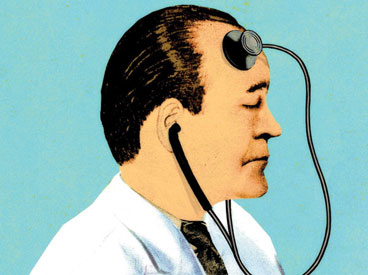
Arrow pointed out several big reasons why healthcare can’t work like ordinary free enterprise, including an unavoidable lack of steady demand, lack of knowing for sure what will work, and lack of transparent prices. Take a case like mine: You go for years with such perfect health you might assume you have no need for insurance at all. Then, out of the blue, you become ill with a devastating disease that will cost hundreds of thousands of dollars to treat. You may be so stricken when it hits that you can’t make any judgments about costs, and no matter what, you can’t really know what outcome a particular treatment will have, how much it will ultimately cost, or how much it would cost from a different doctor or hospital. Meanwhile, the system encourages your doctors and medical facilities to order more and more tests and services for you, and gives insurers every reason to refuse to pay for whatever they can avoid covering. As a patient you’re trapped not only by terrible illness but also by an insurance set-up you can’t possibly stay on top of. It’s as bad for doctors as it is for patients, too. A recent survey of 24,000 physicians found that only 54 percent of them said they would choose medicine again if they were starting their careers over. David Korn, a former dean of medicine at Stanford University, blamed a lot of that frustration on the nation’s lack of a single-payer healthcare system. The flood of paperwork every doctor faces is “a crushing burden that no doctor enjoys,” he said. Howard Forman, a professor at Yale, added that “the transformation of the field from independence and professionalism to being commoditized and feeling like you’re just another worker is disheartening to some.” And doctors worry the Obamacare, with all its intricacies, will only make things worse. Obamacare, the latest attempt to fix the ever-worsening mess, was signed into law in 2010. The Act aims to extend insurance coverage to every American. This is an extremely complex law, but it is possible to reduce it to a few basic principles.
• Spreading the costs equitably by requiring us all to buy insurance or pay a penalty—the much debated “individual mandate.”
• Requiring every insurance company to sell insurance to anyone who wants it, regardless of pre-existing conditions.
• Offering subsidies to help the needy pay for their mandated insurance, so the cost doesn’t burden anyone excessively.
• Setting up “exchanges,” state-based marketplaces where people can shop for insurance and compare plans and prices, to make the system as transparent and fair and economical as possible.

Obamacare is, of course, as controversial as anything about American health insurance has ever been. Supporters point out that adding coverage for tens of millions of uninsured Americans and removing the threat of losing coverage for millions more like me with preexisting conditions, is a huge accomplishment. Critics complain that, like the failed Clinton plan, the new law is much too complicated, that it does far too little to rein in costs, and that the individual mandate is un-American in its almost socialist coerciveness. Furthermore, Obamacare does very little to end the crushing conflict between doctors and insurers and patients.
What has allowed other countries to insure more of their citizens at lower costs and with better health results than us? That story begins in Europe way back in the late 19th century. Germany, under Chancellor Otto von Bismarck, instituted compulsory healthcare coverage for workers in 1883; a main reason was a desire to win the sympathies of left-leaning workers before they rose in open revolt at a dangerously unsettled time. Most other northern European nations followed Germany’s example and had some form of broad, if not universal, coverage by the time of World War I.
Canada is often held out as an example of both the advantages and disadvantages of such nationalized systems. There, individual provinces, and then the national government, instituted universal healthcare beginning in 1947. It all began when a working-class boy named Tommy Douglas had to have a leg amputated and got it done for free by a surgeon who wanted to show his students the procedure. Douglas was inspired to set out to make free healthcare possible for all, and he got the first plan launched in his home province of Saskatchewan. Canadian Medicare, as the set-up is now called, covers everyone in the country with tax dollars, with almost no deductibles or premiums from the patient. Doctors bill the government without patients even being involved in the paperwork. The total cost of healthcare per person is roughly two-thirds of that in the U.S. More than 80 percent of Canadians prefer their system to the U.S.’s. They like it so much that in 2004 the national broadcasting system held a poll to pick the greatest Canadian of all time, and the winner was Tommy Douglas. The biggest complaint about Canadian healthcare is that patients have to wait from several weeks to several months for care that isn’t urgent. However, the government has been working to address that problem, and in any life-threatening situation, care is given right away.
What hope is there for real improvement of the healthcare mess here in the U.S.? Marcia Angell, M.D., a Harvard Medical School faculty member and former editor in chief of the New England Journal of Medicine, argues that Obamacare can’t possibly do it. The Massachusetts health plan that it is modeled on doesn’t do nearly enough to fix the system’s bad incentives and hold down costs. She writes that Obamacare “requires people to buy a commercial product from investor-owned companies at whatever price the companies choose to charge. In short, people are required to contribute to the profits and corporate salaries and marketing costs of companies like WellPoint and UnitedHealthCare.”
As it happens, the chief executive officer of UnitedHealth Group Inc. was the single highest paid executive in the U.S. in 2009, taking home an astounding $102 million. Angell writes, “A few years ago, in a private discussion with a senior executive of America’s Health Insurance Plans, the industry’s trade association, I was told that if the [Obamacare] regulations did squeeze the profits of the insurers, they would simply raise the premiums. There is nothing … to prevent that.”
Marcia Angell’s prescription: “A single-payer system is the only way to [cover everybody] while containing costs. Polls have shown that most Americans favor it, and a Massachusetts survey showed that physicians there prefer it to the state’s current system. I’ve advocated extending Medicare to everyone by dropping the qualifying age one decade at a time, and delivering it in a nonprofit system, something I believe the public would enthusiastically accept.”
That sounds revolutionary in a country so wedded to a would-be free-market approach to healthcare. But if and when we finally get there, we’ll only be catching up with the rest of the world.
Become a Saturday Evening Post member and enjoy unlimited access. Subscribe now




Comments
Clearly, Samantha lives on a different planet than me. I wonder where? Or more likely, I wonder where I am? Potato chips cost more because of food stamps. On my planet, that’s just shockingly _____________ (you fill in the blank.)
Maybe its just me, but this should be a no-brainer. We, the USA, are never going to get respect from the rest of the World, be recognized as a Super Power by continuing with this craziness. Healthcare. Everyone should have a right to it-EVERYONE. Free, or affordable. Rich, poor, young, old…..very sad, and neither party has even come close to fixing this….
Once again I read another commentary on Health care problems….and It ends as most do….ie, the COST OF MEDICAL CARE…..When are we going to stop sympathizing witn our poor doctors and nurses….We seem to think that we must pay them what they want, not based on the value of their time (which is only slightly more that the time spent with other service providers) and their threat that they will go out of business if their practice depends on Medicare approved payments…..ie, they will not make as much money as they would like to make….not whatever they deserve for the service they have provided and the time it took them to do so….This same applies to all institutions (hospitals, nursing homes, etc) and their staff…..they want to make as much money as any one will pay…..regardless of their often “nonprofit statis”. The whole system is out of whack and goverened by regulations which encourage indiviual greed…..
Quote:
“To my immense good luck, I have a generous employer with a great insurance plan that makes it all affordable.”
$70,000 annually is not affordable no matter who is paying. Either taxpayers or consumers are the ones, in fact, who are footing your own health-care costs. You seem to exempt yourself from the fact that your costs are not a burden for all of us, in the same way that are ER visits that go unpaid. Even if Medicare was made available to every citizen, it’s still the taxpayers and consumers who are the real payers. In the same way that the $102 million executive is a costly middle man, so is the government with Medicare. It’s meaningless to have any middlemen, at all, between patients and providers. For those with catastrophic illness, let the government come to their aid in the same way that FEMA comes to the aid of natural-disaster victims.
If Medicare and insurance (for sneezes and head colds) had never been introduced, health care would still be affordable enough for each person to pay his own way for everyday healthcare.
Another truth that fails all, is that the billions spent on health care does not go into pockets of consumers, but into the pockets of health-care professionals, instead, professionals who are driven by greed to cheat patients, the government and insurance companies, alike. Doctors, for example, used to live across the street from us; now they’ve all moved into multi-million dollar homes in gated communities, dining in four-star restaurants each evening where servers would rather mug them than smile — all on the backs of taxpayers and consumers.
“…smoothly working market for healthcare, just as we have for food and housing and automobiles”
You’re kidding, right? You could’ve purchased a homee for cash in the 50s for little more than a year’s wages; today, the same home requires all of 5 to 6 year’s of wages, and if you count interest, 10-15 years. A car from China costs $2,000. Here: 10 to 20 times more expensive. Potato chips have risen even faster in price, thanks to food stamps that have increased demand. Since Obama, food-stamp costs have spiraled, yet no one can connect the dots to the spirally cost of food. There has been nothing smooth about food, housing and automobiles.
Talk computers and consumers electronics, instead, and now you’re talking about smooth. A color TV in the 60s cost $1,200. In constant dollars today, it translates to $10,000. I just bought a new flat screen for less than $400. In 60s’ dollars, it translates to less than $40.